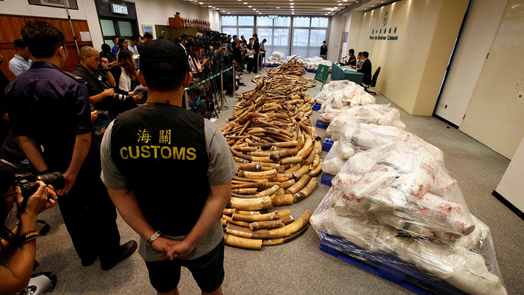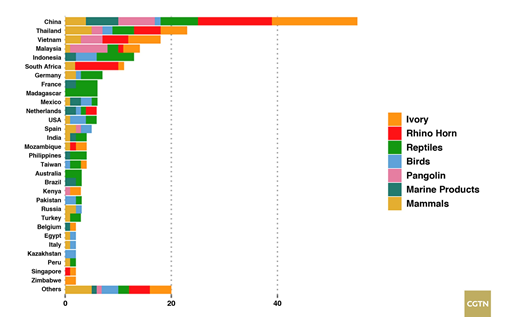
Ivory tusks seized by Hong Kong Customs are displayed at a news conference in Hong Kong, China, July 6, 2017. (Photo: CGTN)
The smuggling of endangered wildlife through airports is witnessing an unprecedented rise. Illegal rhino horn seizures at air entry points tripled last year alone, a new report has revealed.
Altogether, ivory weighing 45,000 kg, more than 1,900 kg of rhino horns, and 131,564 reptiles were seized at various airports between 2009 and 2017.
Traffickers are increasingly using large airports for transporting ivory, rhino horn, reptiles, birds, pangolins, marine products and mammals, according to an analysis of open-source data from 136 countries.
Airports have become a favorite mode to fly endangered wild animals from “Africa to Asia, often transiting first through the Middle East and Europe,” claimed the report titled “In Plane Sight" released on Monday.
The report was produced by an alliance of eight organizations, including the United States Agency for International Development.
"Checked luggage" accounted for nearly half of all the endangered wildlife seizures. Air freight was second making up about 19 percent, and passenger seizures comprised 11 percent.
“Traffickers are increasingly abusing transport systems to move their products quickly and securely,” said Juliana Scavuzzi, senior manager of environment, Airports Council International (ACI) World. "During the journey from source to market, airports may be used in the transit.
“This provides airports with an important opportunity to play their role in preventing wildlife trafficking.”
The data also revealed that the top six airports by seizure count are located in the top four countries – China, Vietnam, Thailand and Malaysia.

Number of endangered wildlife seizures by country for those countries with 10 or more seizures (2009–2017). (Graphic: CGTN)
However, not all airports are keen on carefully screening luggage for illegal wildlife items. Airports in the UK and US reported a high enforcement ratio of 92 and 85 percent respectively. Chinese and African airports ranked third with a score of 82 percent each.
Japan, a destination country for wildlife products with high-quality infrastructure, is low on catching the smugglers with enforcement rate of 23 percent.
Wildlife protection groups claim that more than 20,000 African elephants are brutally killed for ivory every year. According to IFAW estimates nearly 1,500 rhinos were poached for their horns in 2015 alone.
Concerned over the scale of poaching, the US and China, including its Hong Kong Special Administrative Region and Taiwan region, have banned ivory trade. The UK has proposed one of the world’s strictest ivory bans, and Australia is holding public hearings to take a similar decision.
The illegal trade of wildlife is the fourth largest black market in the world – worth 20 billion US dollars annually – and impacts more than 7,000 species of animals and plants.
“Criminals involved in wildlife trafficking are often directly connected to other illegal networks, including narcotics and human trafficking. By addressing wildlife trafficking, airports and airlines not only help protect endangered species, but they also strengthen their operations and supply chains,” said Michelle Owen from TRAFFIC, a wildlife monitoring organization.


